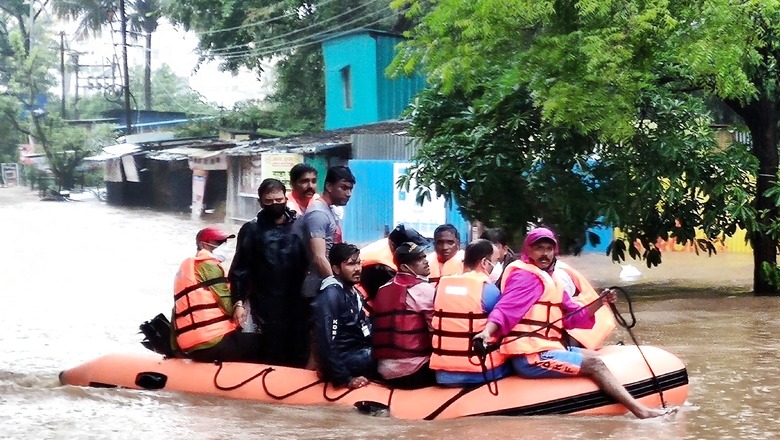
views
Extreme climate events are not “equal opportunity” threats. They discriminate against the elderly, the poor, people with chronic health conditions, and people from underdeveloped countries, inhabitants from small island nations—making it harder for them to regulate their lives. At greatest risk of extreme climate change events are our future generations, and it is a wake-up call, ringing loud and clear, for governments all over the world to sit up and take action.
Year 2021 has been challenging for India. Along with a raging pandemic, the country witnessed devastating floods and cyclones. Cyclone Tauktae created havoc in western India while Cyclone Yaas killed many in the east. Floods in the Himalayan region have been occurring at ferocious intensity—experts have cited glacial meltdowns as the main cause.
And, if that was not enough, floods triggered by heavy rains in Maharashtra have killed hundreds this month. With 50 degrees Celsius (122 degrees Fahrenheit) becoming the new normal in Northern India during summers, the sharp rise in temperatures and the accompanying heat waves are proving equally fatal as other climatic disasters.
Not just India, adverse weather events across the globe have forced everyone to ask—if we are staring at an impending climate pandemic. From floods in China and Germany to abnormally high temperatures (heat domes) in parts of the US and Canada, we are clearly at the receiving end of nature’s fury.
What we are witnessing has been predicted by scientists years ago—in some cases, the impacts are worse than what was predicted. Yet, these recent extreme weather events across the globe highlight the need for more research to understand how they will play out in the near future, especially locally.
The Importance of IPCC Reports
In this context, the ongoing two week-long virtual meeting of IPCC (Intergovernmental Panel on Climate Change) where scientists are discussing the impact of climate change on the world is crucial. Governments all over the world rely on IPCC predictions even as they develop policies to reduce greenhouse gas emissions, implement laws, and decide how to protect their citizens from extreme weather events.
The IPCC recommendations will form the basis for the COP26, the United Nations Climate Change Conference in Glasgow in November, where global leaders will meet for the first time since 2019 to discuss strategies to cut greenhouse gas emissions.
The IPCC Working Group I report set to be released in August will help nations, from policymakers to civil society to private sectors, understand the science behind rising temperatures, extreme weather and other adverse impacts that are fuelled by climate change, and what we can still do about it. This report is not a solution but is crucial in outlining and implementing policies and laws in specific areas and with specific timelines.
The IPCC is credited with helping push policymakers to embrace the more ambitious goal of limiting global warming to 1.5°C. By influencing global ambition, the 1.5°C report in 2018 earlier demonstrated the power of the IPCC to permanently shift the global climate conversation through science.
The IPCC presents the scientific foundation upon which international climate change negotiations and action are based. In fact, the UN further outlines that COP27 and 28, in 2022 and 2023, respectively, will also benefit from the information in the remaining two IPCC reports (Working Group-II and Working Group-III are due for release in February and March 2022 ) in this cycle, which will cover impacts, adaptation, and solutions to climate change. In each case, the report findings will provide the scientific foundation on which negotiations will be based. Critically, this assessment cycle as a whole will be one of the main inputs for the Global Stocktake, the process by which global progress towards meeting the goals of the 2015 Paris Agreement will be assessed.
“We have been telling the world that science has spoken and it’s now up to the policymakers for action”, said IPCC Chair Hoesung Lee.
Time is running out for us, and IPCC reports and COP26 will be key in providing a blueprint for countries, including India, to mitigate the adverse impact of climate change.
The author is the Founder Young Environmentalists Programme Trust, National Coordinator Oceans Climate Reality Project India, Ambassador for India Global Quest International on coral propagation, researching globally on the ocean habitat and community as a certified diver. The views expressed in this article are those of the author and do not represent the stand of this publication.
Read all the Latest News, Breaking News and Coronavirus News here.




















Comments
0 comment